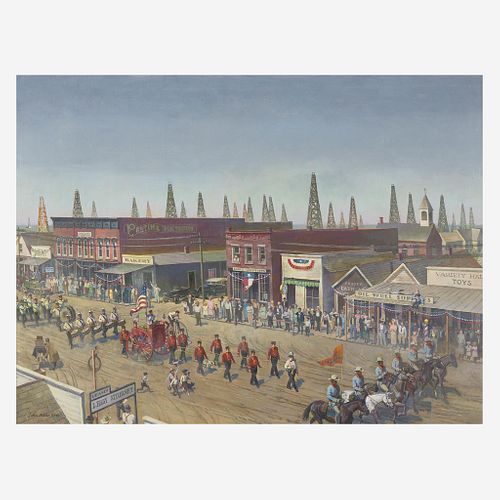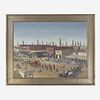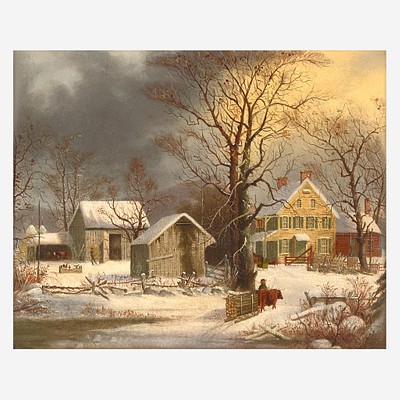John Philip Falter (American, 1910-1982) Armistice Day Parade of 1922, Mexia, Texas
About Seller
2400 Market St
Philadelphia, PA 19147
United States
Established in 1805, Freeman’s Auction House holds tradition close, with a progressive mind-set towards marketing and promotion, along with access to a team of top experts in the auction business. And now with offices in New England, the Southeast, and on the West Coast, it has never been easier to ...Read more
Two ways to bid:
- Leave a max absentee bid and the platform will bid on your behalf up to your maximum bid during the live auction.
- Bid live during the auction and your bids will be submitted real-time to the auctioneer.
Bid Increments
| Price | Bid Increment |
|---|---|
| $0 | $25 |
| $500 | $50 |
| $1,000 | $100 |
| $2,000 | $200 |
| $3,000 | $250 |
| $5,000 | $500 |
| $10,000 | $1,000 |
| $20,000 | $2,000 |
| $30,000 | $2,500 |
| $50,000 | $5,000 |
| $100,000 | $10,000 |
About Auction
Dec 7, 2021
On December 7, Freeman's will bring to sale a selection of about forty paintings from a private Texas collection. Freeman's info@freemansauction.com
- Lot Description
John Philip Falter (American, 1910-1982) Armistice Day Parade of 1922, Mexia, Texas
Signed, copyrighted and dated '80' bottom left; also dated '1922' verso, oil on canvas
(30 x 40 in. (76.2 x 101.6cm))
Footnote:Exhibited
"An American View: The Hosek Collection of American Art," Pearl Fincher Museum of Fine Art, Spring, Texas, August 22 - December 20, 2009.
Note
Born in Nebraska, John Falter began his career in illustration earlier than most of his comtemporaries, langing a signficant job before even graduating. Soon, Falter decided to moved to New York, and worked with George Wright to produce commercial works that could appak to both magazines and private clients. His talent led him to produce no less than 185 cover illustrations for The Saturday Evening Post, as well as over 300 recruiting posters for the U.S. Navy, all marked by a fierce attention to detail (allowed by a remote vantage point) and the desire to render an idyllic vision of rural America.
The present work showcases the artist's affinity to the West. As Dr. Lisa Peters states: "Located in northeast Linestone county Texas, Mexia was founded in the nineteenth century and named for a Hispanic hero of the Republic of Texas Army during the Texas Revolution. The town’s growth was spurred by the Houston and Texas Central Railway, which included a stop near the town, beginning in 1907. However, it remained a relatively small community until 1920, when the discovery of a natural gas deposit by the Mexia Gas and Oil Company led to a dramatic increase in the town’s population, from 3,482 to 35,000, over the course of a couple years. At one point in 1922, when local authorities could not control the town’s growth, martial law was declared. In 1922—the peak of the town’s oil production—thirty-five million barrels of oil were generated. (By the mid-1920s, when the initial oil boom ended, Mexia’s population, declined to 10,000.) It is the phenomenon of industry bearing down on a place that still carried on small-town life that Falter captured. The buildings along Main Street include prototypical village stores. Stores simply labeled 'Bakery,' 'Meat,' and 'Variety...Toys,' suggest that the town had only one of each kind of vendor. However, conspicuous in the lower left is a store labeled 'Oil Well Supplies,' demonstrating the infiltration of the oil company in the life of Mexia."
Armistice Day Parade of 1922, Mexia, Texas depicts Mexia's celebration of Armistice Day on November 11, 1922, probably the first celebration of its type in the town. While it is unclear if Falter indeed participated in the event, Peters considers that the painstaking details in the painting suggest that he could have had access to photographs of the event. The viewer here is presented with " a marching band led by drummers, a brigade of firemen with an old fashioned fire wagon, once pulled by horses, and a line of mounted men in cowboy hats and chaps, one of whom holds a flag that reads 'San Juan Hill,' referencing the 1898 Spanish-American War battle that took place near Santiago, Cuba. A barefoot boy in a tricorn hat walks with his dog in the parade, holding a flag aloft. A crowd of polite spectators stand at the sidelines, some holding their hands to their hearts to pledge their allegiance, while others salute the soldiers. Behind Main Street is a typical country church, its spire blending in with the towers of the oil wells that rise across the length of the town and into the distance. The towers seem to mimic the church spire as if to be innocuous under the guise of a religious association. In his painting, Falter contrasts the scene of joyful patriotic pride with the menacing, surreal presence of the oil well towers. Having replaced any signs of the natural landscape, they appear to move stealthily on the town."
Condition report:Frame: 37 3/4 x 47 3/4 x 1 3/4 in.
- Shipping Info
-
No lot may be removed from Freeman’s premises until the buyer has paid in full the purchase price therefor including Buyer’s Premium or has satisfied such terms that Freeman’s, in its sole discretion, shall require. Subject to the foregoing, all Property shall be paid for and removed by the buyer at his/ her expense within ten (10) days of sale and, if not so removed, may be sold by Freeman’s, or sent by Freeman’s to a third-party storage facility, at the sole risk and charge of the buyer(s), and Freeman’s may prohibit the buyer from participating, directly or indirectly, as a bidder or buyer in any future sale or sales. In addition to other remedies available to Freeman’s by law, Freeman’s reserves the right to impose a late charge of 1.5% per month of the total purchase price on any balance remaining ten (10) days after the day of sale. If Property is not removed by the buyer within ten (10) days, a handling charge of 2% of the total purchase price per month from the tenth day after the sale until removal by the buyer shall be payable to Freeman’s by the buyer. Freeman’s will not be responsible for any loss, damage, theft, or otherwise responsible for any goods left in Freeman’s possession after ten (10) days. If the foregoing conditions or any applicable provisions of law are not complied with, in addition to other remedies available to Freeman’s and the Consignor (including without limitation the right to hold the buyer(s) liable for the bid price) Freeman’s, at its option, may either cancel the sale, retaining as liquidated damages all payments made by the buyer(s), or resell the property. In such event, the buyer(s) shall remain liable for any deficiency in the original purchase price and will also be responsible for all costs, including warehousing, the expense of the ultimate sale, and Freeman’s commission at its regular rates together with all related and incidental charges, including legal fees. Payment is a precondition to removal. Payment shall be by cash, certified check or similar bank draft, or any other method approved by Freeman’s. Checks will not be deemed to constitute payment until cleared. Any exceptions must be made upon Freeman’s written approval of credit prior to sale. In addition, a defaulting buyer will be deemed to have granted and assigned to Freeman’s, a continuing security interest of first priority in any property or money of, or owing to such buyer in Freeman’ possession, and Freeman’s may retain and apply such property or money as collateral security for the obligations due to Freeman’s. Freeman’s shall have all of the rights accorded a secured party under the Pennsylvania Uniform Commercial Code.
-
- Buyer's Premium



 EUR
EUR CAD
CAD AUD
AUD GBP
GBP MXN
MXN HKD
HKD CNY
CNY MYR
MYR SEK
SEK SGD
SGD CHF
CHF THB
THB












